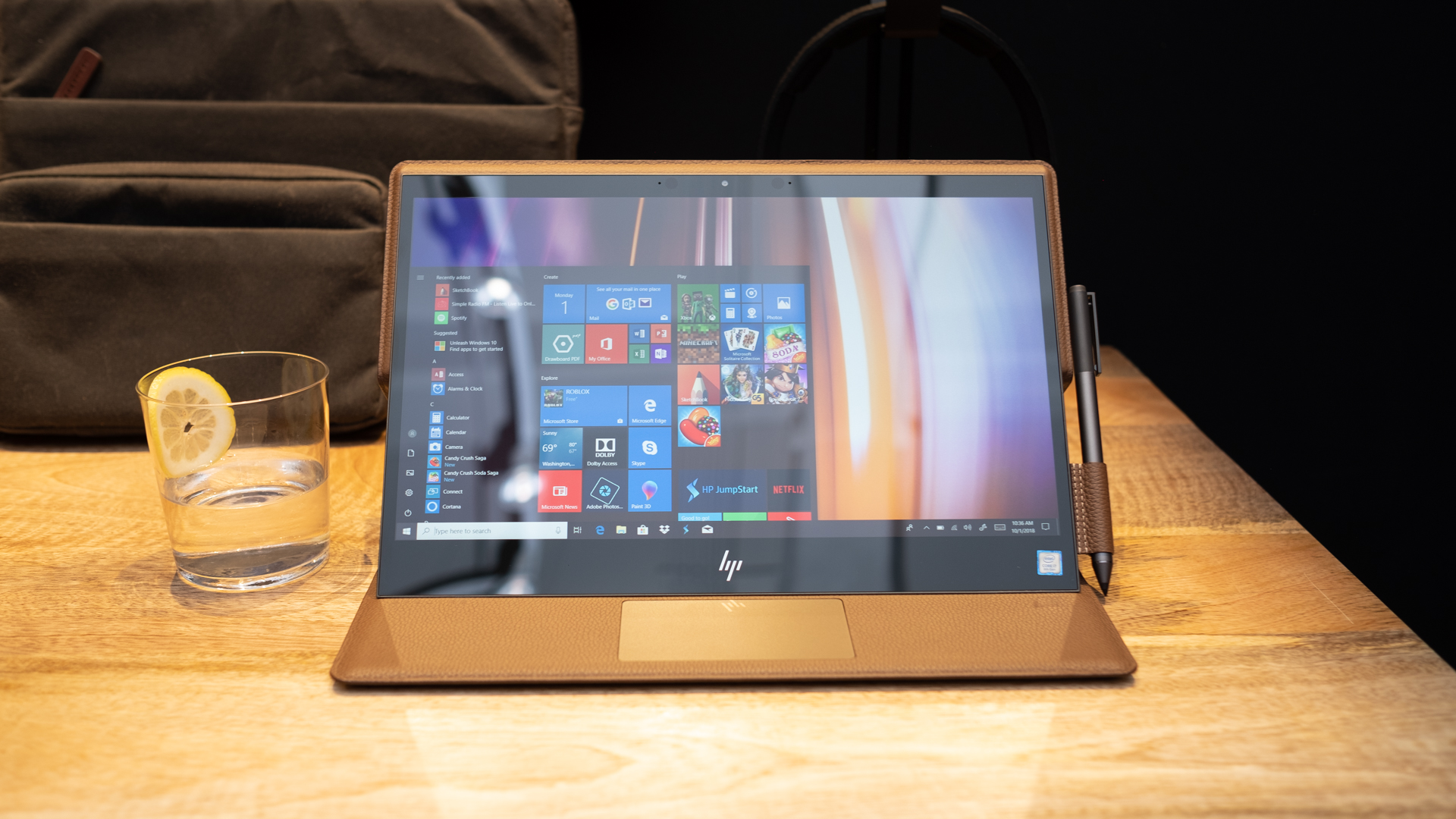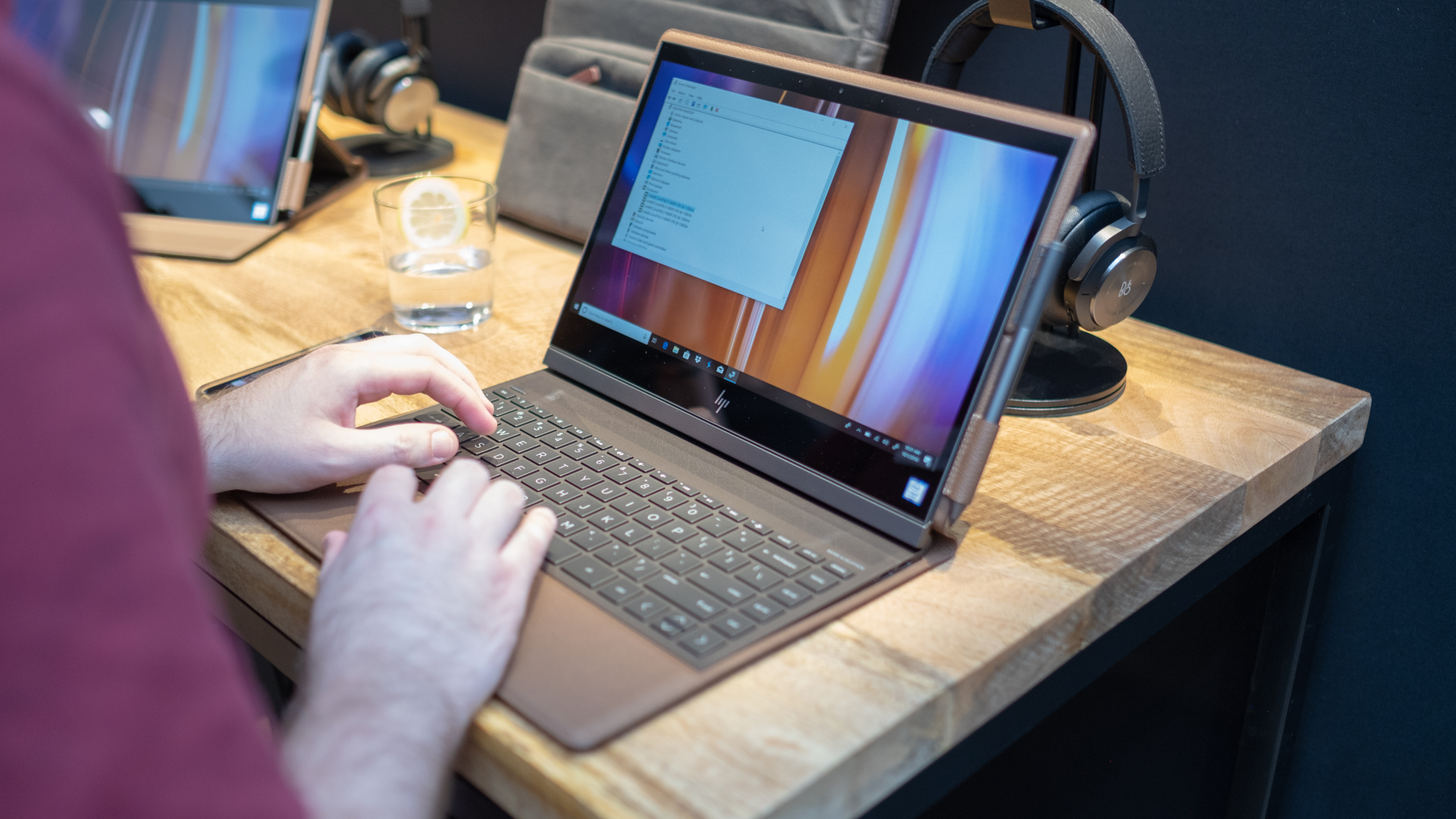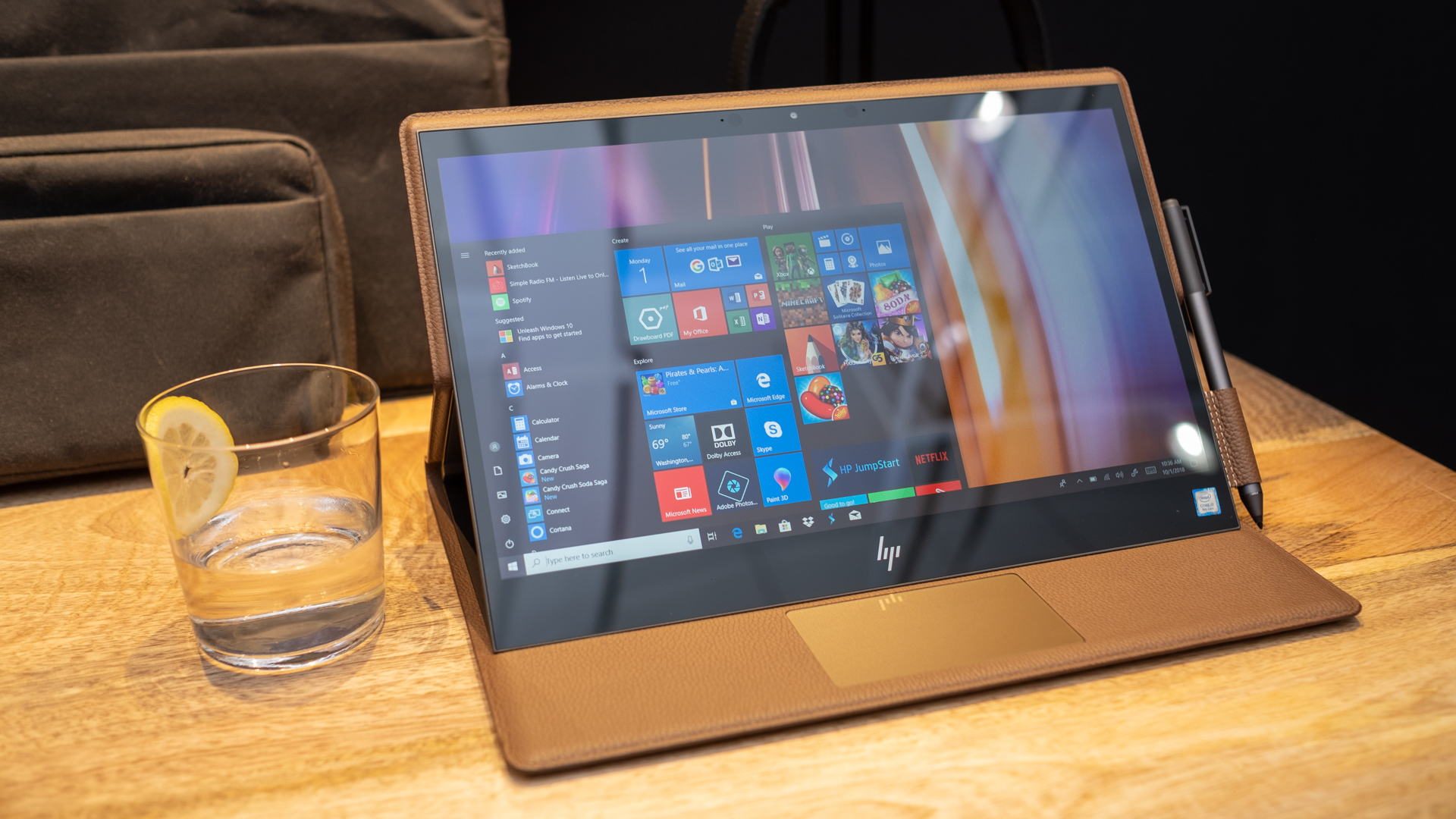HP Spectre Folio
HP has promised to “reinvent the PC” with its latest 2-in-1 laptop: the HP Spectre Folio. This device takes a cue from Microsoft’s Surface line of products, building its hardware directly into the pure leather folio – get it? – case the surrounds it.
The result is an absolutely beautiful, convertible 2-in-1 laptop, with power efficient, yet capable and long-lasting, components, that’s giving us trouble sussing out just who it’s for. Mid-level executives might go wild for this laptop, but will anyone else, like students and digital artists or just general users?
Unfortunately, we don’t have an answer for that based on just a short time with this device, but something tells us deeper inspection won’t produce a crystal clear answer either.
Pricing and availability
HP is asking for $1,299 (about £999, AU$1,799) for the entry-level version of Spectre Folio. This gets you an Intel Core i5-8200Y fanless processor, 8GB of DDR3 memory and a 256GB M.2 SSD. This all drives a 13.3-inch Full HD (1,920 x 1,080), WLED touchscreen behind Corning Gorilla Glass.
From there, HP wants $1,499 (£1,499, about AU$2,000) for the model housing a Core i7-8500Y processor with an LTE modem attached for wireless connectivity anywhere. Of course, this will require an additional data plan from a phone carrier, but Sprint is offering six months free with the purchase of this Spectre Folio model in the US.
This puts the HP Spectre Folio closely in line with the foremost flagship laptops, like the 12-inch MacBook and Surface Pro (if you go all-in for the keyboard cover). And, you’re getting everything in one package, with the stylus included.
Design and display
HP crafted the Spectre Folio from an entirely different standpoint than it's used for its previous flagship laptops and tablets. Most notably, the Folio design started with, well, the folio piece. The Spectre Folio is built directly into a piece of genuine leather – that’s right, the keyboard cover is included and cannot be detached, as it’s part of the device.
The brown leather certainly feels pleasant to the touch, and will help immensely in keeping the device in one place on otherwise slippery surfaces, like glass, marble or granite. Of course, this isn’t simply a laptop that’s bound in leather… it’s a 2-in-1 laptop that’s bound in leather.
This device features a semi-detachable keyboard that appears to connect over Bluetooth with the main system. Behind the screen is a seam in the folio case that allows the device to transform into new use modes. Pull the screen toward the touchpad and stop just before it for a convenient way to watch movies and videos.
Pull the screen even further toward the device’s base, and it will rest on top of the keyboard for a pure tablet mode. We have to say, this is definitely the ideal way of presenting a tablet mode within a convertible 2-in-1 laptop design, but getting there is the dodgy part.
In our first moments with the Spectre Folio, we opened the laptop from a completely closed position only to have the display go a little wild on its hinge. It appears that using this laptop as intended will require some adaptation on your part.

Once you open the leather lid, you’re met with a gorgeous display that produces vibrant colors with its WLED backlighting and wide-enough viewing angles with IPS technology inside. The included stylus feels substantial and, in tandem with the display, produces an excellent drawing experience.
The keyboard you’re met with looks fantastic, but we find it to be a little squishy on the key press, but plenty punchy on the way back to its resting state. On the other hand, it’s well spaced and smartly laid out.
That makes both the keyboard and touchpad a mixed bag, as we find tracking and clicking on the Spectre Folio touchpad to be just fine. However, tracking with your thumb resting on the bottom of the touchpad for clicking – something many a laptop user does – doesn’t seem to work.
Considering you’re stuck with these two input methods if you decide to pick up this bad boy, it might be best to try this laptop out at a local retailer before plunking down the kingly sum it commands.
In terms of connectivity and other design features, the Spectre Folio employs two Thunderbolt 3 (USB-C) ports, one straight USB-C 3.1 port and Windows Hello biometric login through an infrared webcam. Plus, a headphone jack remains.

Performance
Naturally, we’re not about to judge this device on performance we’ve yet to fully test, but let’s discuss what HP is putting out purely based on previous experience. First off, the Spectre Folio is a fanless device, meaning its processor is low-power enough so as to not require fans inside to cool it.
This already speaks volumes as to what the Folio is capable of: expect performance similar to that of a 12-inch MacBook, frankly. With that in mind, don’t expect to get through serious video or photo editing on this device – or hardcore data crunching – without some hemming and hawing.
However, raw power clearly isn’t HP’s aim here, but rather versatility and longevity. For that reason, HP used the majority of the space beneath the keyboard for battery cells, custom designing a motherboard with Intel to make the necessary room.
The result, as HP claims, is up to 17 hours and 15 minutes of mixed use on the Core i5 model, and up to 13 hours and 45 minutes of mixed use on the Core i7 version. We’ve never seen anything close to these numbers on an Intel Y Series system, so we’re excited to put it to the test in a full review.
Even if the battery numbers don’t add up, this device can charge from zero to 50% juice in just 30 minutes using one of its three USB-C ports, which should alleviate much of users’ battery woes when on the go.

Early verdict
All told, we’re very much on the fence about the HP Spectre Folio. Going into this reveal, we were told that HP is reinventing the PC – with a hashtag and everything. However, what we’ve just seen and handled may be beautiful and elegant, but it’s not reinventing anything.
We’ve even seen this design approach to 2-in-1 laptops before, and we weren’t exactly big fans of it then. This is clearly the most advanced application of such a design to date, but in our early time with it, we didn’t find it to be silky smooth in execution. This may be on account of a learning curve, but it nevertheless makes for a mixed first impression.
This is another one of those high-end, 2-in-1 laptops that we’re having difficulty sussing out a target audience for. Here’s hoping that a full review sheds some light on these necessary questions.
0 comments:
Post a Comment